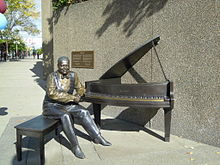| No. 252 of the ongoing ITYWLTMT series of audio montages can be found in our archives at https://archive.org/details/pcast252 |
=====================================================================
Tomorrow,
we will be celebrating Canada’s 150th birthday, and though I
expect a great deal of overt security measures in and around Parliament Hill
and Ottawa’s downtown core, our city will no doubt throw an epic Birthday
party!
I thought
it was fitting for me to share a podcast to celebrate Canada’s birthday and I
decided to focus on one of Canada’s most famous exports.
Every
mooring around 6:30, my bus drives along Albert st. in Ottawa and I get to see
the statue of the Canadian jazz pianist Oscar Peterson (1925-2007) on the
South-West corner of Canada's National Arts Centre. The statue shows Peterson
as if he had just finished playing and had turned toward his audience.
The life
size statue includes a space for visitors to sit next to him. More often than
not, at the time I go past the statue, some construction workers share their
morning coffee sitting next to Oscar – I don’t think he’d mind!
Peterson
grew up in Montreal’s Little Burgundy, a predominantly black neighbourhood
where he found himself surrounded by the jazz culture that flourished in the
early 20th century. His father, Daniel Peterson, an amateur trumpeter and
pianist, was one of his first music teachers. As a child, Peterson studied with
Hungarian-born pianist Paul de Marky, a student of István Thomán, who was
himself a pupil of Franz Liszt. At the age of nine Peterson played piano with
control that impressed professional musicians.
Peterson
also credited his sister—a piano teacher in Montreal who also taught several
other Canadian jazz musicians, most notably Oliver Jones—with being an
important teacher and influence on his career. We’ll get back to Daisy a little
later in my commentary.
In 1940, at
fourteen years of age, Peterson won the national music competition organized by
the Canadian Broadcasting Corporation. After that victory, he dropped out of
school and became a professional pianist working for a weekly radio show, and
playing at hotels and music halls. Called the "Maharaja of the
keyboard" by Duke Ellington, Peterson released over 200 recordings through
a career that spanned 6 decades, won eight Grammy Awards, and received numerous
other awards and honours. He is considered one of the greatest jazz pianists,
and played thousands of concerts worldwide.
One such
concert took place at the Orpheum theatre in Vancouver, August 8, 1958, and
featured Peterson with the most familiar formulation of his Trio, with bassist
Ray Brown and guitarist Herb Ellis.
From that
concert, I retained a number of tracks for today’s montage, some Jazz
standards, others featuring original compositions by the members of the trio
including The Music Box Suite, a piece inspired by Peterson’s sister,
Daisy. The selections include Peterson’s audience banter between tracks,
including his narrative for the Music Box Suite, a fitting display of his
obvious admiration for his sister.
My profession has taken me to every part of the world, none of them more beautiful than where I live. As a musician, I respond to the harmony and rhythm of life, and when I’m deeply moved it leaves something singing inside me. With a country as large and as full of contrast as Canada, I had a lot of themes to choose from when I wrote the Canadiana Suite. This is my musical portrait of the Canada I love.
The second
part of the montage is a complete performance of the Canadiana Suite,
probably his best known composition. Commissioned by the CBC in 1963, it is a
collection of eight short tableaux that moves its listeners across the Canadian
landscape on a conceptual railway journey, starting in the Maritimes (Ballad
to the East), sweeping through the Laurentian Mountains (Laurentide
Waltz) to Montreal (Place St. Henri), Toronto, (Hogtown Blues)
Manitoba (Wheatland), Saskatchewan (Blues of the Prairies) Calgary (March Past) and ending in British Columbia (Land of the Misty Giants).
The
performance, recorded for Limelight Records on September 9, 1964 (nominated for
a Grammy Award in 1965 for best jazz composition) features yet another
incarnation of the Oscar Peterson Trio, this time replacing Ellis with drummer
Ed Thigpen.
I think you will love this music too!


No comments:
Post a Comment